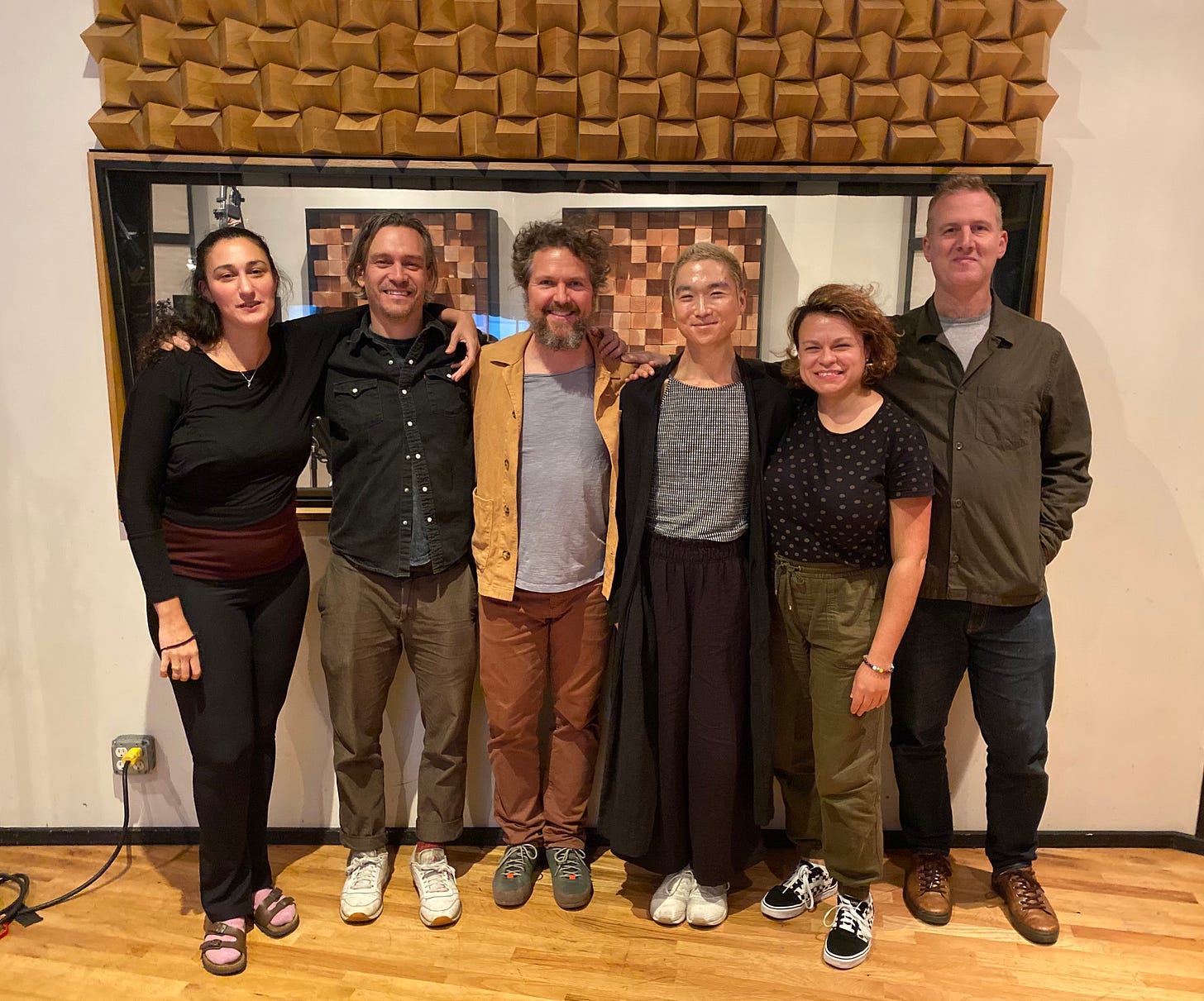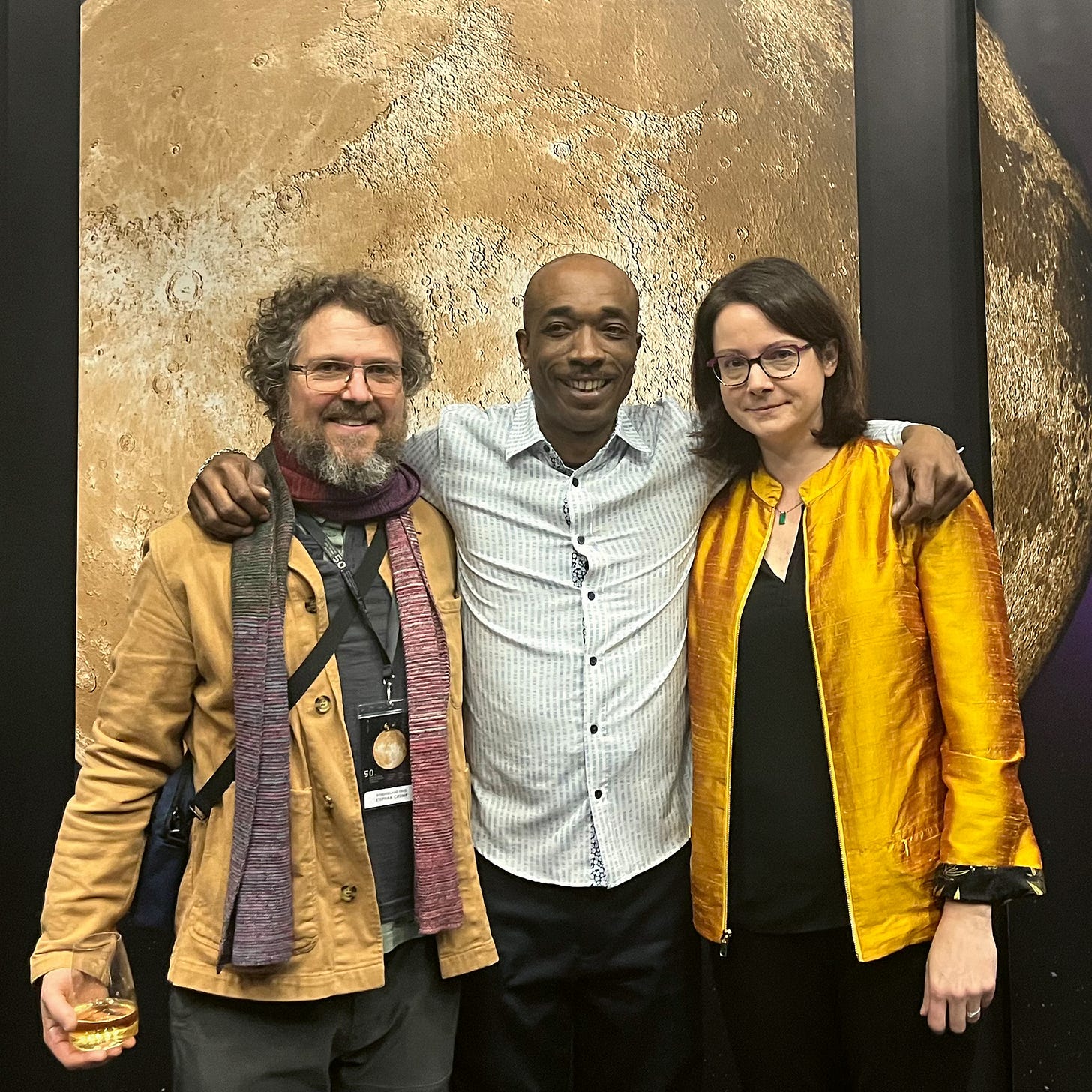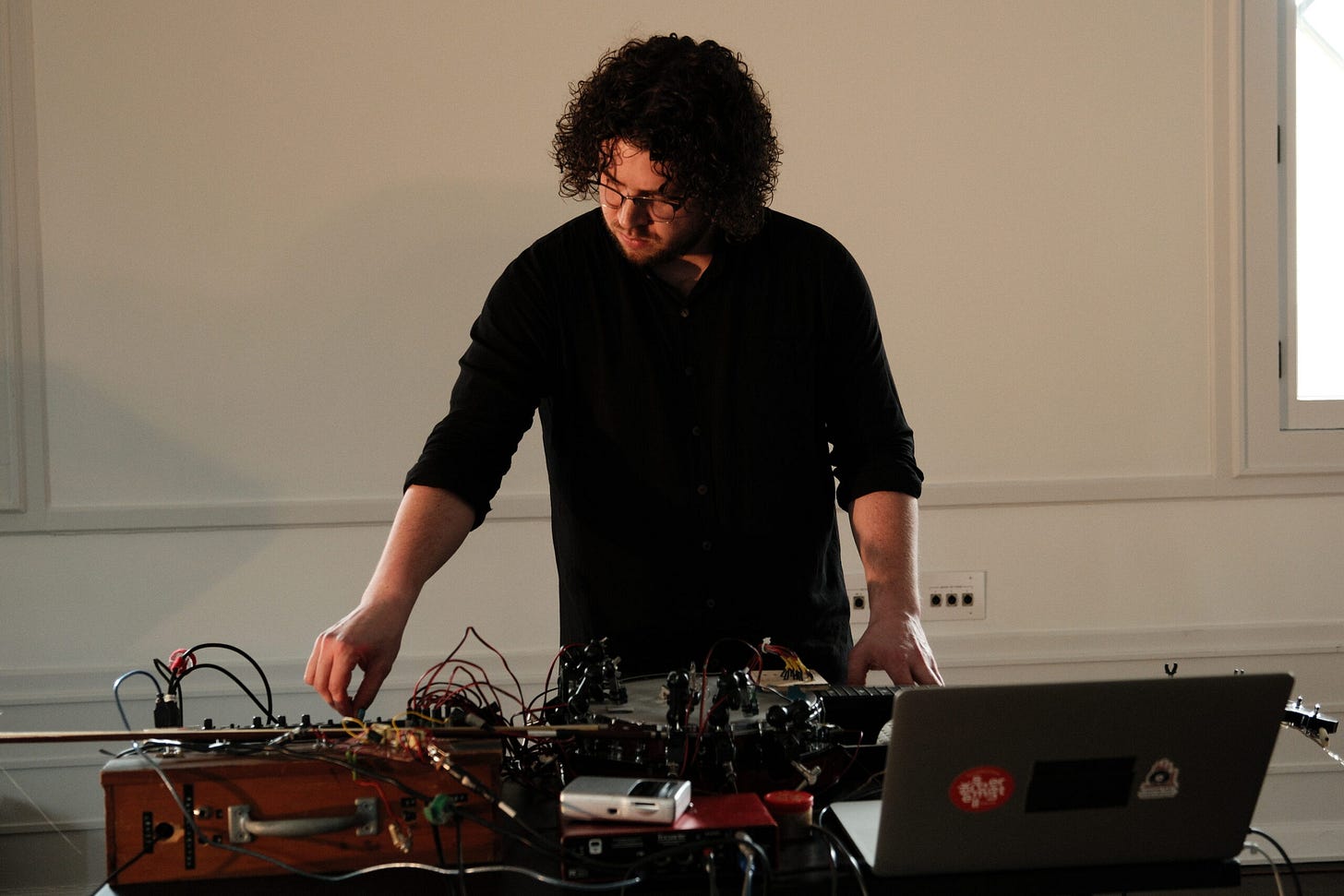Improvisation, Every Which Way
Borderlands Trio, Stephan Crump, Wendy Eisenberg & Caroline Davis, Weston Olencki
Stephan Crump Leans in to Deep Improvisation
A few years ago I was asked to write a liner note essay for Wandersphere (Intakt), the second album by Borderlands Trio. I enjoyed Asteroidea, the first album that pianist Kris Davis, drummer Eric McPherson, and bassist Stephan Crump improvised together, but right away I knew that Wandersphere was different; more sustained, instinctual, trusting, exploratory, unafraid. When I interviewed the musicians about the project Crump explained his interest in mycorrhizae, “the fungi that possess a symbiotic relationship with plant life that’s helped ensure the survival of forests for centuries,” as I wrote in the essay. The metaphor makes perfect sense for the way Borderlands Trio operate, creating something collectively that relies upon a simultaneous sort of nurturing: a wide open sonic ecosystem. The four astonishing pieces on that double CD each run between twenty and forty minutes, but I never felt the passage of time when I listened. To me this was freely improvised music of the highest caliber, with three of the greatest players in contemporary post-bop eschewing any given language, brushing away any rules. Instead they listened and built something together.
Wandersphere is a masterpiece, with all three players deploying a huge variety of techniques and gestures according to the spontaneous requirements of what they constructed in real-time. At the time I was especially surprised by the expanded palette of drummer McPherson—one of the best time drummers in jazz, who can make rhythm crackle with mere whispers. He transformed his kit into a kind of mini-gamelan that found common cause with Davis’ adroit piano preparations. The music took me all kinds of places, summoning images and visions in a way that rarely happens for me. I’ve since been able to hear the band live, in Lisbon and Berlin, and not only were they extraordinary, casting the same sort of transcendent spell with the gentlest motions and the most meticulous accents, but each performance sounded totally different. Such unpredictability is a natural upshot of strong improvisation, but over the years I’ve realized even the greatest improvisers can struggle to conjure a new world each time they play. So far Borderlands Trio have achieved that feat, and they’ve done it yet again with its masterful third album Rewilder (Intakt), another double album, featuring music that pushes in yet another new direction.
This time out the connection to post-bop is more explicit. Crump and McPherson play patterns, lines, and grooves more often, the individual pieces are more succinct, generally compacting a couple of ideas into a dense narrative, but it’s no less satisfying than the patient sprawl of Wandershphere. Below you can hear one of the shorter tracks from the new recording, “Axolotl.” There are different kinds of meditative reveries, but in general the pulse is quicker, the textures spikier, and melodies less guarded, as the shifts come faster, even when the music often seems to be floating, as on the remarkable “Monotreme.” You can hear isolated bits of playing that suggest a solo, such as Crump’s tremulous arco improvisation about eleven minutes in, but considering the form of every piece is created on the spot, there’s never any kind of expected round of solos. Instead there’s an endless give-and-take, or, even better, simultaneity, where we can hear three fertile, febrile imaginations achieving balance, forging conflict, or doing both at the same time, somehow. The fact that these players never seem to run out of ideas or lose the thread continues to blow my mind. Even on a piece like “Tree Shrimp,” where McPherson’s fluency with rimshot rhythm brings out a dubby openness, Davis and Crump don’t give into a feel-good reggae jam, instead playing around it plenty of spry energy and lilting motion to create an excellent aural tug-of-war that doesn’t let competition get in the way of agile music-making. Even on a piece like “Lost Species,” a 23-plus minute marvel that opens disc 2, there is a strong rhythmic prerogative as the trio seem to cycle through an endless churn of recalibrations. Nothing ever stays in one place for very long, but there’s no sense of impatience in the air. There are other ways to improvise, but as my interest in the way working units can repeatedly manufacture something so ineffable and moving grows, it’s hard to think of many practitioners I’d rather settle in with.
Crump drew upon another force of nature for his excellent new project Slow Water (Papillon), drawing inspiration from the Erica Gies book Water Always Wins, which lays out the redemptive, healing power of the planet’s waterways and the natural world within which they evolve. It’s the meddling of humanity that fucks everything up (this is a very crude reduction of her ideas.) The book gave Crump a sense of hope and trust, and he imagined how those notions could be applied to a new ensemble. The music on Slow Water alternates between through-composed, tender melodic constructions and patient, prompt-driven collective improvisations which take after the various aquatic strata of our lakes, rivers, and seas. Each movement flows liquidly into the next, all of it interpreted by a superb band built around brass and strings: violist Joanna Mattrey, violinist yuniya edi kwon, trombonist Jacob Garchik, trumpeter Kenny Warren, and vibraphonist Patricia Brennan. I have to imagine Crump’s ongoing experience with Borderlands Trio fed into this project, as the improvised passages project a similar depth and level of empathy. Still, the lack of drums and the specific instrumentation produces a much different sound that’s more chamber-like in ambience, and more subdued in its melodic expression, even when something is sunny as the closing piece “Bend.”

“Hyporheic” is one of the open pieces, of which Crump writes, “This is the zone that flows under the stream bed, where sediment and soil are saturated with water. Akin to our own gut microbiome, the hyporheic zone is host to invertebrate fauna (see, or hear, “Meiofauna”) who play a critical role in the overall health of the water system.” Translated into sound, there’s a spindly, fraught energy, with lines that scamper and slide, as individual voices initially produce terse, isolated shimmies and eddies, but they’re gradually pulled together with what almost seems like an undertow anchored by the bass. “Accrete” gradually applies layers of blended sounds atop a skeletal, descending bass pattern, with some of voices shaping a mewling drone as trumpeter Warren unleashes a gorgeously lyric solo. The composed pieces tend to be livelier, like “Eager,” a warm, tuneful celebration of the beaver, an animal that has traditionally helped make land arable. The pretty theme isn’t exactly jaunty, but there is an abiding tenderness for the animal its title describes. Buoyant melody lines in the graceful composition are passed around between different sections of the sextet, spiked with a subtle tension. Below you can check out one of the more propulsive pieces in the suite, “Euphotic,” a surface area of water where enough light breaks through to allow for photosynthesis. The piece ripples with shifting lines pulling and pushing in different directions, although everything radiates from Crump’s strong, full-bodied line.
The Many Moods (and Styles) of Wendy Eisenberg
I can’t think of too many musicians that embrace such an agnostic attitude towards genre as Wendy Eisenberg—guitar and banjo player, singer, songwriter, improviser. From the first time I heard their music my expectations have been repeatedly, nonchalantly challenged; back in 2018 I heard Its Shape is Your Touch (Vin du Select Qualitite), a terrific collection of acoustic, post-Derek Bailey free improv, and The Machinic Unconscious (Tzadik) high-octane, electric trio with bassist Trevor Dunn and drummer Ches Smith. At the time they seemed quite disparate, but subsequently it’s become clear that those recordings fit easily with the musician’s creative sprawl. Eisenberg has never made any fuss about their casual range and curiosity, so it’s taken me some time to fully grasp how naturally they move between modes, whether visceral or sweet. I spent a certain amount of time grappling with Eisenberg’s output, trying to figure out what their core was about, until finally realizing that even if ambiguity isn’t the heart of their work, in many ways it’s a defining characteristic.
That’s certainly the case with the recent Accept When (Astral Spirits), a fantastic duo album with alto saxophonist Caroline Davis that happily slides around between jazz, pop, and experimental impulses. Davis is a superb musician who has also refused to be boxed in by any particular approach—back when she lived in Chicago I was a big fan of her nimble post-bop quartet and trio with drummer Charles Rumback and guitarist Jeff Swanson called Whirlpool. Even though I didn’t follow her other activities so closely, I know she was working in R&B and other song-driven pursuits. Since she moved to New York in 2013 she’s continued to expand those ideas with a more elastic, ambitious coterie of players. Davis and Eisenberg composed the album’s ten pieces together, most of which feature the later on both guitar and voice, although there’s always plenty of interplay and improvisation, even within more pop-oriented pieces.
An instrumental piece like “Sequins” features breathless give-and-take, with cascading lines that align and pull apart, both shadowing and confronting each other, while “Slynx” is a jagged and noisy heavily improvised piece that almost seems conventional in the context of the other pieces. The delicious tangled “How Sensitive” borrows the chords from Jobim’s iconic bossa nova “Insensatez” to create a wonderfully dense harmonic nest that owes as much to Tristano, Konitz, and Bauer as it does to Brazil. I really love the whole album, which features Deerhoof drummer Greg Saunier on a couple of tracks—including the shimmering “Concrete,” which offers a microcosm of many of the duo’s concerns, opening with free improv but morphing into a mournful pop ballad until it’s hijacked by the saxophonist’s upper register cries and Saunier’s spasmodic drumming. But my favorite of late has been “Flounced,” a vocal tune with a deliciously weird melody a la Brian Wilson; outfitted with a more elaborate arrangement this tune could double as a Pet Sounds outtake. Check it out below.
I’m excited that I’ll belatedly get to experience Eisenberg in several contexts this summer. In August I’ll get to hear them as a member of Bill Orcutt’s Guitar Quartet in Lisbon at Jazz em Agosto, but on Wednesday, June 12 they’re in Berlin to collaborate with Sberna & de Oliveira, an Italian improv-folk duo that clearly shares their gleeful marriage of pop forms and pure experimentation, with a performance at Sowieso.
Weston Olencki’s New Sounds for Banjo
Weston Olencki has been experimenting with the banjo for several years now, and as much as they have immersed themselves in old-timey and bluegrass tradition, their own use of the instrument has been decidedly unconventional. Last year I wrote about the music on the 2022 tape Old Time Music ((Tripticks Tapes), but Olencki’s practice has evolved dramatically since then, as documented on last month’s Pearls Ground Down to Powder (Full Spectrum), which, as the blurb helpfully notes, “ presents two opposing sides of the same banjo.” It’s one of the best things I’ve heard from the musician yet. The first side of the album is occupied by “the rocks are different here,” in which small robotic machines unleash a dizzying array of rhythms across different parts of the instrument, beginning with dry, percussive splatter before moving to deeply resonant curtains of string-driven sound somewhere between hammer dulcimer and prepared piano. The back-and-forth between fractured robot rhythms and brittle chords that suggest malfunctioning clock chimes was fun to watch live, but it’s even more rewarding to simply hear.
Olencki has a tendency to analyze sound material with mathematical rigor, and I’ve learned not to dig too deep into the background context of these works, as the writing tends to impinge upon the pure sonic pleasure the pieces deliver. For example, Olencki drew inspiration from the great sibling harmony singers in country music—the Louvins, Stanelys, and Osbornes—to formulate “Brothers,” a dazzling extended drone played out on a pair of justly tuned banjos, which bears no palpable relation to the source concept, despite some obvious technical parallels. You can listen to it, below. Olencki will share this music Tuesday night at KM28 when they play an opening set for Matmos, who will present an improvised four-channel set.
Helping Handouts
It’s no secret that funding for the arts is usually limited and often fleeting. In fact, everyone involved within the larger context of creative work, including journalists, presenters, and photographers, often struggle to get by. There are no shortage of worthwhile campaigns to finance specific projects and endeavors, and if I didn’t need to watch my budget I’d happily fork over endless funds. But I don’t know many people who can do that. But I also understand how fatiguing it can be when folks ask for money. Shit, I hate to do it, which is why this newsletter remains accessible to all, even though I’m very grateful for those readers who’ve shown their appreciation by paying for Nowhere Street, which you can still do by clicking the link at the bottom of the page. But I’m sharing a couple of recent solicitations that I find of genuine merit.
The one-and-only Japanese guitarist/turntablist Otomo Yoshihide is looking for financial support to make a fall tour in Europe by his big band a reality. Likewise, Slovenian photographer Ziga Koritnik is trying to raise money to publish a book collecting photographs he shot of the great German saxophonist Peter Brötzmann. I’m sure any contribution to these causes would not only be appreciated, but they will reap dividends to a large cohort of listeners down the line. Also, just as I was finishing up this week’s newsletter I learned that New York musicians Claire Dickson and Maya Keren lost nearly all of their belongings in a house fire on Saturday. There’s a campaign to help them back on their feet and to find new digs.
Recommended Shows in Berlin This Week
June 11: Matmos; Weston Olencki, 8:30 PM, KM28, Karl Marx Straße 28, 12043 Berlin
June 12: Wendy Eisenberg, guitar, voice, with Sberna & de Oliveira (Beatrice Sberna, voice, and Gabriel de Oliveira, 8-string guitar, voice), 8:30 PM, Sowieso, Weisestraße 24, 12049 Berlin
June 13: p.e.r.s.o.n.a.l. c.l.u.t.t.e.r.; Jessie Marino, 8:30 PM, KM28, Karl Marx Straße 28, 12043 Berlin
June 13: Håvard Wiik, piano, Antonio Borghini, double bass, and Steve Heather, drums, 8:30 PM, Sowieso, Weisestraße 24, 12049 Berlin
June 13: TIAN (Judith Wegmann, piano, Burkhard Schlothauer, violin, viola, Angelika Sheridan, flute, Julien Pontvianne, clarinet, tenor saxophone, Ulrich Phillipp, double bass), 8 PM, Exploratorium, Zossener Strasse 24, 10961, Berlin
June 14: Brad Henkel Quartet (Brad Henkel, trumpet, Reiko Okuda, piano, Isabel Rößler, double bass, and Sam Hall, drums), 8:30 PM, Donau115, Donaustraße 115, 12043 Berlin
June 15: Michaël Attias, alto saxophone, Flo Müller, electric guitar, Jonas Westergaard, double bass, and Oli Steidle, drums, 8:30 PM, Sowieso, Weisestraße 24, 12049 Berlin
June 15: Waed Bouhassoun & Orpheus XXI, 7 PM, Pierre Boulez Saal, Französische Straße 33d, 10117 Berlin
June 16: Rəhman Məmmədli & Band, 8 PM, Jugend[widerstands]museum Galiläakirche, Rigaer Str. 9/10, 10247 Berlin
June 16: Werner Durand 70th Birthday Celebration: Honey III (Catherine Lamb, Rebecca Lane, Dina Maccabee, voices, Sam Dunscombe, Bryan Eubanks, Werner Durand, Michiko Ogawa, clarinets, and Uli Hohmann, gongs); Modal Sax (Werner Durand, tenor saxophone, and Uli Hohmann, hand drums); and Anna Clementi & Phonosphere (Werner Durand & Jens Strüver), 8 PM, Petersburg Art Space, Kaiserin-Augusta-Allee 101, 10553 Berlin, entrance in the courtyard, Aufgang II, 1 OG





Could you provide a correct link for the Ziga Koritnik book project please. Thanks for what you do.
I saw Eric McPherson at London’s Ronnie Scott’s in the early 2000s. He was playing with Jeremy Pelt’s band. It was a mind-blowing performance. He had that Jonesian mix of intensity and subtlety. Great to have him back on my radar. You’ve done us a kindness. Many thanks.